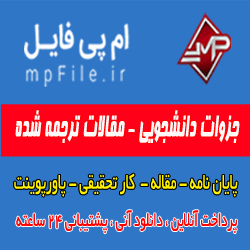
دانلود مقاله ترجمه شده حقوق: دیدگاه حقوق و اقتصاد در مورد INJUCTIVE RELIEF
فرمت فایل دانلودی: .docxفرمت فایل اصلی: doc
تعداد صفحات: 12
عنوان ترجمه فارسی : دیدگاه حقوق و اقتصاد در مورد INJUCTIVE RELIEF
نویسنده/ناشر/نام مجله : Maastricht Journal of European and Comparative Law
سال انتشار2010
تعداد صفحات انگلیسی: 7
تعداد صفحات فارسی:12
نوع فایل های ضمیمه Pdf+Word
عنوان مقاله انگلیسی: A Law and Economics Perspective on Injunctive Relief
دانلود رایگان مقاله انگلیسی
Abstract
The Law and Economics perspective on injunctive relief has been developed primarily from the Calabresi and Melamed (1972) distinction between property rules and liability rules, two different judicial means of enforcing legal rights. Their analysis is predicated on the assumption that, if the prevention of the unlawful activity by an injunction does not reach the efficient solution between the relevant parties, then the latter can modify the terms of the injunction by means of bilateral negotiation, drawing on Coase’s social basic analysis. The approach is particularly important once it is appreciated that legal entitlements are imperfectly formulated and that, in appropriate circumstances, legal wrongdoing can increase social welfare. For example, in areas where intellectual property rights are particularly difficult to formulate because of the high technology involved, too rigid an enforcement of those imperfectly targeted rights generates welfare losses. The task for economic analysis is then to determine whether injunctive relief or damages is preferable in the particular circumstances governing the parties’ activities. This largely involves comparing on the one hand the welfare losses which arise from imperfect damages award which arise predominantly where the court has high information costs in assessing the plaintiff’s losses (particularly where those losses are subjective and therefore cannot be determined by reference to market evaluation) or include irrecoverable third-party losses with, on the other hand, the transaction costs of negotiating a compromise solution or the welfare losses arising from a holdout (both conditions are likely where more than two parties are involved). One branch of the literature has added a new dimension to this analysis. It is concerned to explore how the choice of remedy ex post affects behaviour ex ante, in particular the propensity to invest. In addition, literature on optimal enforcement provides insights regarding the optimal timing of sanctions, which is relevant for the choice between injunctions (the first possible stage of legal intervention) and damages (the last possible stage
چکیده
دیدگاه حقوق و اقتصاد در مورد INJUCTIVE RELIEF در درجه اول از تمایز CALABRESI و MELAMES (1972) میان قوانین مالکیت و قواعد مسئولیت، دو معانی قضایی مختلف در خصوص اجرای حقوق قانونی، توسعه یافته است. تجزیه و تحلیل آنها دلالت بر این فرض دارد که، اگر ممانعت از فعالیت های غیر قانونی توسط یک دستور به یک راه حل کارآمد بین احزاب مربوطه نرسد، و سپس دستورات بعدی میتوانند با استفاده از مذاکرات دوجانبه تغییر یابند، تجزیه و تحلیل اساسی کوش در این میان مطرح میگردد. این رویکرد به ویژه زمانی مهم است که درک شود که استحقاقات قانونی، ناقص فرموله شدهاند و در شرایط مناسب، تخلف قانونی میتواند رفاه اجتماعی را افزایش دهد. برای مثال، در مناطقی که در آنها، تدوین و فرموله حقوق مالکیت معنوی به دلیل تکنولوژی بالا، امری دشوار است، اجرای محکم این حقوق ناقص منجر به ضرر و زیان در رفاه میگردد.
کار تجزیه و تحلیل اقتصادی این است که تعیین نماید آیا INJUCTIVE RELIEF و یا خسارات در شرایط خاص حاکم بر فعالیتهای احزاب ترجیح داده میشوند یا خیر. این امر تا حد زیادی شامل مقایسه از یک طرف ضرر و زیان رفاهی میگردد که از خسارات ناقص نشات گرفته و عمدتا در حالتی بوجود میآیند که در آن دادگاه دارای هزینه های اطلاعاتی بالا در ارزیابی خسارات شاکی (به خصوص در جایی که این ضرر و زیان ها ذهنی هستند و بنابراین نمیتوانند با اشاره به ارزیابی بازار تعیین شوند) میباشد، یا شامل خسارات غیر قابل جبران شخص ثالث بهمراه، از سوی دیگر، هزینه های معامللاتی در خصوص مذاکره در مورد راه حل سازش یا ضرر و زیان رفاه ناشی از holdout میگردد (هر دو شرایط احتمالا در جایی وجود دارند که در آن بیش از دو طرف درگیر هستند).
یک شاخه از ادبیات، یک بعد جدید به این تحلیل اضافه کرده است. این بعد، کشف چگونگی انتخاب راه حل برخورد، به ویژه تمایل به سرمایه گذاری است. علاوه بر این، ادبیات در خصوص اجرای مطلوب به ارائه بینشهایی درباره زمانبندی بهینه تحریم ها میپردازند، که مربوط به انتخاب بین احکام (اولین مرحله ممکن مداخله قانونی) و خسارات (آخرین مرحله ممکن) است.

